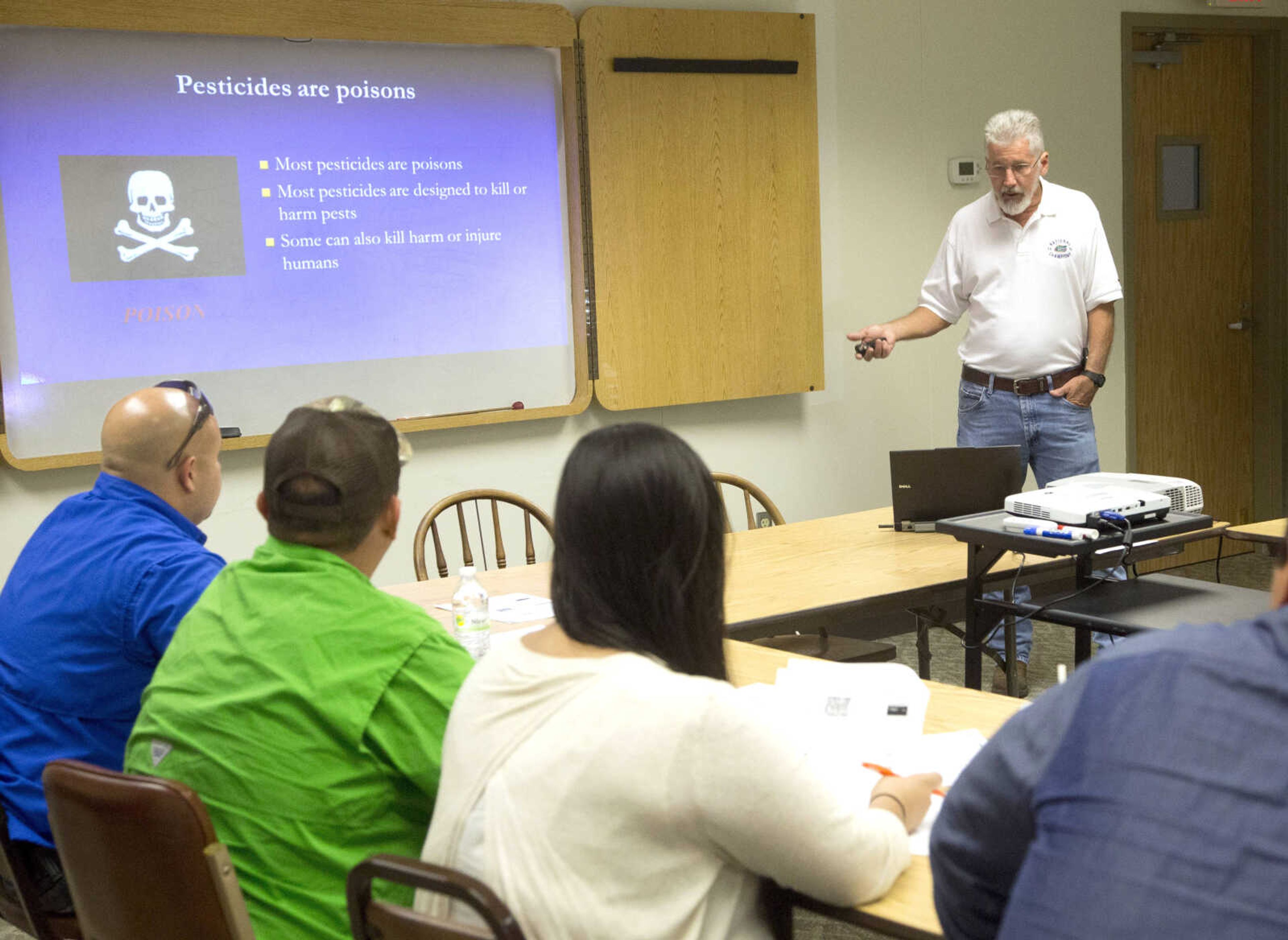Review reveals problems protecting workers from pesticides
BELLE GLADE, Fla. -- Dozens of farmworkers looked up at the little yellow plane buzzing over the Florida radish field, a mist of pesticide falling from its wings. Farmworkers are supposed to be protected by government rules regulating exposure to toxic farm chemicals. But in this case, the breeze pushed the pesticide over the crew in a neighboring field, where it fell mostly on women, including at least one who was pregnant...
BELLE GLADE, Fla. -- Dozens of farmworkers looked up at the little yellow plane buzzing over the Florida radish field, a mist of pesticide falling from its wings.
Farmworkers are supposed to be protected by government rules regulating exposure to toxic farm chemicals. But in this case, the breeze pushed the pesticide over the crew in a neighboring field, where it fell mostly on women, including at least one who was pregnant.
"I smelled a strong odor and started feeling bad," worker Maria Garcia later told a state investigator. "I had a headache, itchy eyes and threw up."
The health investigator assigned to the case said more than a dozen workers showed symptoms of pesticide poisoning, and also found evidence the farm and crop-dusting contractor may have violated federal farmworker safety laws.
An Associated Press review of federal and state enforcement data and other records revealed the pesticide-safety system is riddled with problems: Investigations often take years to complete and result in few penalties. Written warnings are common, fines rare. Compliance is sometimes voluntary, not required. And worker anonymity can be compromised, making employees reluctant to report violations.

The agriculture industry defends the system, saying the low numbers are a sign farms are doing a good job of protecting workers.
President Barack Obama's administration recently adopted tougher farmworker protections after 20 years of debate and fierce resistance from the chemical and agricultural lobbies. The more stringent regulations adopt annual training requirements, safeguards to keep children workers out of the fields and stronger penalties for companies that retaliate against workers who report violations. However, when they take effect in 2017, all of the new rules still will rely on the existing enforcement system.
Adding to the troubles are the regulators themselves. In all states except California, enforcement of federal pesticide-safety laws is managed by the same agencies that promote agricultural industries.
The Florida workers fell ill Oct. 14, 2014, in Belle Glade, a farm town near Lake Okeechobee where the motto is "Her soil is her fortune." They had been moved at the last minute to a celery field owned by Duda Farms. Rains the previous night had made the fields they were supposed to plant too soggy.
That was not communicated to the crop-duster pilot, who should have waited to spray a "restricted-use" pesticide called Bathyroid XL, records show.
Bathyroid XL is listed as a probable human carcinogen, according to the U.S. Environmental Protection Agency. Studies on rats showed some neurological effects, but the results of long-term exposure on people are not known. As a restricted-use agent, it is considered one of the more toxic pesticides available to American farmers.
Twelve women including Garcia and one man were hospitalized. Many were released and cleared to go back to work after a few hours. But some, including the pregnant worker, required follow-up medical screening for lingering symptoms, according to state health records about the incident.
Despite the findings about pesticide poisoning and evidence of violations, a state investigation resulted in no punishment for the farm and, after more than a year, only the small fine for the crop duster, according to the case file obtained by the AP through a public-records request. Workers contacted by the AP said they were never interviewed.
"The Florida system is terribly broken," said Greg Schell of Florida Legal Services, a national expert who has been litigating farmworker cases for decades. "Unless you see somebody being sprayed, it's your word against the employer."
Florida is the nation's second-largest agricultural state, with more than 47,000 farms. Inspectors conducted 785 worker-protection inspections in 2014, the last year for which data was available. That's more inspections than any other state in the region, yet they issued only seven fines for a total of $11,400.
The numbers are comparable in other states.
In tobacco-growing North Carolina, only three fines were levied in 2014 against farms for violating pesticide protections. In the Cotton Belt states of Georgia and Alabama, there were no fines, according to data gathered by the AP.
It's not clear how many workers get sick from pesticides each year. No one gathers comprehensive data.
A program run by the National Institute of Occupational Safety and Health identified 5,200 workers with acute pesticide-related illness, and eight deaths, in 11 states between 1998 and 2006. Those cases included only poisonings confirmed by doctors.
Using that data and other sources, the EPA estimates that the nation's 2 million farmworkers suffer 10,000 to 20,000 cases of doctor-diagnosed pesticide poisoning in the U.S. every year.
Low enforcement numbers also reflect workers' fear of reporting problems.
Many field hands have come to the U.S. illegally or are here on worker visas, and their immigration status is controlled by their employers.
Until a few years ago, Louisiana pesticide inspectors sometimes required farmworkers to travel hundreds of miles to Baton Rouge to lodge pesticide complaints in person. That practice was halted only after litigation and an EPA investigation that the state fought.
After the incident in Belle Glade, some of the Florida workers sprayed by the crop duster were advised by supervisors against taking legal action, according to state documents obtained by AP.
"They were told 'You would never find a job in agriculture again. Their husbands may also be fired, and it would take years to get a settlement,"' said Antonio Tovar, the Florida health department investigator on the case.
Luis Martinez, one of the workers in the fields that day, said a lawyer and the safety officer for the farm labor contractor hired by Duda Farms all discouraged him from making a complaint. The company also asked him to take a drug test to prove the symptoms he experienced were not from marijuana or other drugs.
"I feel so bad," Martinez said, "because I have no rights because I have no money and can't afford a lawyer."
Defenders of the agriculture industry say the lack of fines and violations in Florida and other places shows a high level of compliance, not lax enforcement.
"The culture has changed. There may be a few bad apples, but they are few and far between," said Gene McAvoy, who runs state pesticide safety trainings for farm supervisors in Florida.
Farm spokeswoman Donna Duda denied that anyone from the company had spoken to them. She said the company has complied with state investigators and was reviewing its policies after reading the allegations in Tovar's report that workers were pressured not to file complaints.
Jose Ojeda of Martinez & Sons Trucking, the contractor in charge of the workers that day, denied his staff discouraged workers from filing a complaint.
The Florida Department of Agriculture and Consumer Services never interviewed Martinez or any workers about the retaliation or intimidation claims, despite a tip from the health inspector that some workers were talking about it.
In a statement, the agency denied being told about the intimidation allegations and said it would have investigated if it had known. Officials would not answer other questions.
Other workers contacted by AP at their homes in Belle Glade did not want to be interviewed, with one saying she did not want to make trouble.
The EPA said the numbers may be low because workers are reluctant to file complaints for fear of deportation. They also say retaliation violations often are not caught during the routine, random inspections.
Nationwide, few of those violations are ever filed. Data from 2006 to 2013, the years the EPA has available, show that only 13 violations involving companies that threatened to retaliate against employees were reported nationwide -- none in any Southern states.
When workers do come forward, they face a yearslong process that often ends with nothing but a warning for the farm. In other cases, people who complain are sometimes put in professional exile.
North Carolina tobacco worker Cayetano Dominguez-Rosales complained to state investigators when 12 workers on his crew got sick in 2010 after witnessing pesticides being sprayed in a field that was no more than 40 paces away. Records show they all sat down and felt dizzy and nauseas. While heat stroke could have been to blame, it was unusual that so many workers fell ill at the same time, he said.
Dominguez-Rosales said his supervisor told him he would take him to the hospital for $20, a violation of federal law, according to state investigative documents. A clinic worker transported him and a fellow worker to the hospital five days after the incident.
After the hospital trip, he returned to work and was told to sign a "voluntary quit" paper giving up his job. He had worked for 15 years on North Carolina tobacco farms and never fallen ill, he said, but the incident left him without work. He returned to Mexico.
Nearly a year after he left, a state investigation issued a warning to the farm.
Pesticide investigations in North Carolina can take up to two years, and the vast majority nationwide end in warnings.
"A warning just says 'We're not going to hold you responsible for these actions,"' said Caitlin Ryland, an attorney at Legal Aid of North Carolina. "Really, there's no teeth at all in that law."
Delays in North Carolina investigations come largely from staffing issues, said Patrick Jones, deputy director of pesticide programs at the state Department of Agriculture and Consumer Services. The division shares one lawyer from the state attorney general's office with all other agriculture departments. Jones said a new attorney has been appointed, and pesticide cases are expected to be a top priority.
In the future, technology may offer new ways of tracking workers' potential exposure and monitoring their blood for toxins. Some ideas are being tested in California and Washington state.
"It's a problem of scope," said Dr. Thomas Arcury, director of the Center for Worker Health at Wake Forest Baptist Medical Center. Advanced testing "is a great idea, but it would be a fairly expensive proposition, and only a handful of labs can do this with any reliability."
Associated Press video journalist Josh Replogle contributed to this report.
Follow Jason Dearen on Twitter: http://www.twitter.com/JHDearen. His work can be found here: http://bigstory.ap.org/author/jason-dearen .
Connect with the Southeast Missourian Newsroom:
For corrections to this story or other insights for the editor, click here. To submit a letter to the editor, click here. To learn about the Southeast Missourian’s AI Policy, click here.









